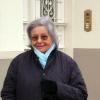The problem of divorced and remarried people and whether or not they should be allowed to receive Communion tops the list of topics discussed during the first week of the Synod of Bishops on the family, according to German priest who has attended the synod sessions.
"I've been keeping a little private checklist," said Jesuit Fr. Bernd Hagenkord, head of the German section of Vatican Radio. "The topic of the remarried divorcees and whether or not they should be allowed to receive the Eucharist has come up 40 times."
"It is, moreover, not only a European topic but has also been brought up by speakers from Asia and Africa," Hagenkord said. "Annulments are certainly another frequent topic. Many are dissatisfied with the present annulment procedure, which they say is too complicated and too time-consuming."
Asked if any of the topics discussed had surprised him, Hagenkord said he found the discussion about polygamy fascinating.
"What should the church do with a man who has three wives and wants to become a Catholic?" he said. "Do we refuse to have him? Or must he drop two of his wives, who are then reduced to nothing? That is surely not the answer. This triggered a debate on the moral consequences of church teaching and how flexibly or strictly it should be applied. And the debate that followed was not apodictic, not about what one should or should not do, but on the human aspect and the people concerned."
Had any suggestions been made as to what positions the church should take in the future? Hagenkord was asked.
"The interesting thing is that all the debates have remained very open," he said. "I haven't seen any party politics. No evidence of the controversies that played a role before the synod. There have, of course, been controversial debates and contradictory opinions, but the people who differ then walk down the steps together and continue debating. The atmosphere has been very open, very collegial."
"The daily one-hour open debate every evening also functioned well this time," he continued. "It was open, and the speakers listened to one another and interacted. And then there were the most important debates of all, of course: the ones in the coffee breaks."
Hagenkord said Pope Francis had not spoken but had listened very attentively throughout all the debates. "Pope Francis listens very carefully and takes notes but never signifies whether he finds an intervention good or bad."
[Christa Pongratz-Lippitt is the Austrian correspondent for the London Catholic weekly The Tablet.]
